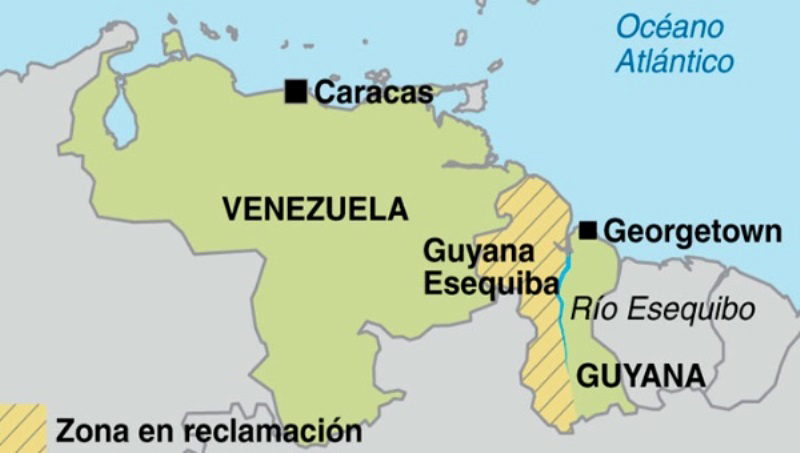US oil giant ExxonMobil is at the centre of a renewed border dispute between Venezuela and neighbouring Guyana. Earlier this year the Guyanese government unilaterally accepted a $200m deal from ExxonMobil to begin offshore oil exploration in the disputed Essequibo zone, which has been under official mediation by the United Nations since 1966. In May 2015 the company reported a ‘significant oil discovery’, fanning the flames of regional tensions. Sam McGill reports.
The blood-stained hand of British colonialism is at the root of this historic border conflict. In 1811 Venezuela became one of the first Spanish American colonies to declare independence and its recognised territory included the region west of the Essequibo river. However, the first republic was destroyed, and sovereignty was only attained after Simon Bolivar’s liberation armies won the Battle of Carabobo in 1821. Venezuela’s borders immediately came under threat from Britain, which controlled what was then British Guiana. Explorer Robert Schomburgk was commissioned by the British government to conduct a survey of British Guiana’s geographical boundaries. He identified the Essequibo and the Orinoco river basins as geopolitical strongholds from which to advance deeper into the continent, drawing the infamous Schomburgk line which attempted to claim the Orinoco river mouth for the British empire. Britain’s interests were further stoked by significant discoveries of gold in the region. In true colonial fashion, a map was drawn up in London and a border declared with scant regard for the region’s inhabitants.
Venezuela appealed to the US, invoking the Monroe Doctrine which stated that further efforts by European nations to colonise land or interfere with American states would be viewed as acts of aggression requiring US intervention. However Venezuelan representatives were blocked from attending the resulting tribunal in 1899 and the US handed over 94% of the disputed territory to the British, with the exception of the Orinoco delta. Venezuela rejected the tribunal’s ruling.
Guyana finally won independence from Britain in 1966 and a framework was agreed by Britain, Guyana and Venezuela for resolving the dispute. Whilst a solution was never reached, the treaty states that activities taking place on the disputed territories ‘shall constitute a basis for asserting, supporting or denying a claim to territorial sovereignty’ and prohibits both nations from advancing the issue except through official international mechanisms and the UN Charter.
Reflecting its colonial legacy, the majority of Guyanese population is descended from African slaves and indentured Indian servants of British and Dutch sugar cane plantation owners. Since independence both the US and Britain have exploited ethnic differences within Guyana, backing alternating political parties pliant to their interests. The US is Guyana’s largest investor.
In 1999, the Indo-Guyanese People’s Progressive Party (PPP) government entered into an agreement with ExxonMobil for the offshore exploration of oil in the disputed territory. In 2012 this exploration was reactivated on a block of disputed maritime water granted to ExxonMobil and Shell. Despite radical rhetoric and participation in regional integration initiatives, the PPP opened the door to a flurry of US and Canadian investment. Whilst lucrative deals were accompanied by accusations of bribery and corruption, Guyana remains one of the poorest Latin American economies with a life expectancy of 66, an unemployment rate of 21.7% and an infant mortality rate of 33.5 per 1,000 live births. After the PPP failed to win a majority in 2011, plans for new infrastructure and legislation were blocked by the opposition, resulting in the suspension of parliament last November. Faced with stalemate, Britain and the US welcomed the end of the PPP ad-ministration and the election of the Partnership for National Unity-Alliance for Change (APNU) in May 2015. President David Granger’s new government immediately lambasted Venezuela as ‘a threat to regional peace and security’, whilst reassuring ExxonMobil that it had ‘nothing to fear’ in its continued exploration of the Essequibo zone. Granger is a former Commander of the Guyana Defence Force who received military training in Nigeria, the US and Britain’s Mons Officer Cadet School, now part of Sandhurst. He is a safe bet.
US Chargé d’Affaires in Guyana, Bryan Hunt, made clear US support for the ExxonMobil operation. British High Commissioner to Guyana, James Gregory Quinn argued that Venezuela’s claim ‘lacks solid ground’, prompting Venezuela’s Ministry of Foreign Relations to condemn interference in ‘matters that are exclusive and total responsibility of two sovereign countries… The former British Empire exploited the people of Guyana and stripped Venezuela of its territory by colonial compromises and fraudulent aims. These impertinent and intrusive statements of the British High Commission…revive old imperial appetites and ambitions.’ Indeed. Venezuelan President Nicolas Maduro has reaffirmed that Venezuela seeks dialogue with Guyana in accordance with the 1966 treaty and has called on the United Nations and the community of Latin American and Caribbean states (CELAC) to mediate diplomatic discussions.
Guyana has benefitted from Venezuela’s regional integration initiatives and is a member of PetroCaribe, which allows member states to purchase subsidised oil from Venezuela on preferential terms. Contrary to media rumours, Venezuela will continue to provide Guyana with around half of its daily oil needs in return for around 40% of Guyana’s rice exports. In July Venezuela cancelled more than US$120m in oil debt accumulated by Guyana. PetroCaribe grants have provided finance for social projects and Guyanese patients continue to benefit from the joint Cuban and Venezuelan ‘Operation Miracle’ project which has provided free cataract operations for over three million people worldwide.
It is this regional integration that the US and Britain are intent on undermining. The discovery of oil in the Essequibo region is a political crowbar in the hands of ExxonMobil and its backers. It is no coincidence that prior to April’s Summit of the Americas in Panama, Obama met with the leaders of Caricom in Jamaica, and offered $20m and an ‘energy security task force’ for the Caribbean in a direct bid to counter existing PetroCaribe initiatives and reassert waning US influence in the region.
FRFI 246 August/September 2015




